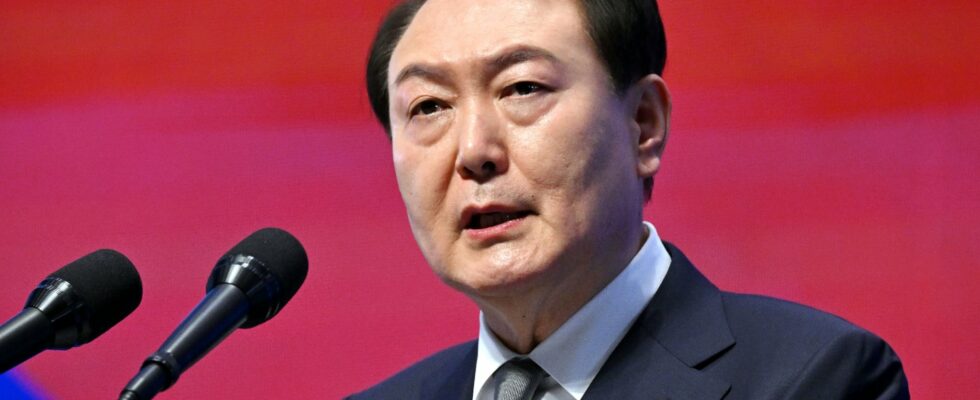How to stop Yoon Suk-yeol? The deposed South Korean president has still not been arrested by the country’s police. Under an arrest warrant for having briefly imposed martial law in South Korea in early December, the leader is the first sitting head of state in history to be targeted by such a procedure. He also sent the army into the national Parliament to try to muzzle him, an episode reminiscent of the dark hours of the dictatorship in the region.
Finally, the 64-year-old president was dismissed on December 14 by the deputies. But Yoon Suk-yeol showed no regret for his actions, even promising his supporters to “fight until the end”. While American Secretary of State Antony Blinken is expected in South Korea at the start of the week, the country is living to the rhythm of this intense political crisis. Still officially president while awaiting confirmation of his dismissal by the Constitutional Court, Yoon Suk-yeol remains cloistered at his home in central Seoul. This Friday, January 3, investigators missed his arrest for the first time… Which opens the way to several scenarios for the future.
A new arrest attempt
The warrant issued against Yoon Suk-yeol runs until Monday, January 6. Investigators can therefore try again to arrest the deposed president, after the failure of a first operation due to the presence of around 200 soldiers and agents of the presidential guard in front of the leader’s home. Several “minor and major” altercations took place between these protection forces and the security services who came to arrest the latter. The attempt was finally abandoned at midday on Friday.
If Yoon Suk-yeol, targeted in particular for “rebellion”, was arrested, he could then be kept in detention for 48 hours. The investigators would then have the choice between requesting another, so-called formal, warrant to keep him in custody longer, or releasing him. The current document is described as “illegal” by the lawyers of the deposed president, who promise to challenge it in court. A new mandate can also be issued when the previous one expires.
A more restrictive arrest warrant
Second possible option, still on the judicial level: try to obtain a more restrictive formal arrest warrant instead of the classic order. This could allow the Senior Corruption Investigation Office (CIO), which centralizes the investigations, to place Yoon Suk-yeol in detention for more than 48 hours.
According to specialists, this scenario is not improbable. The reason given? Yoon Suk-yeol rejected three summons for questioning before finally being targeted by the current warrant, which he also rejects. However, a formal arrest warrant is generally issued when “a suspect refuses to cooperate with the investigation”, explains political commentator Park Sang-byung, according to comments reported by AFP. Yoon Suk-yeol also “encouraged his supporters” to support him, which could be seen by the courts as “recognition of the criminal charges brought against him”.
Support from the interim president
Faced with obstruction, the IOC and the main opposition force, the Democratic Party, asked interim President Choi Sang-mok to force the ousted leader’s guards to cooperate. “It is, in practice, impossible to execute the arrest warrant as long as security officials […] continue their protection” of Yoon Suk-yeol, lamented the IOC in a press release.
This request seems difficult to accept for the interim president. Choi Sang-mok already finds himself in a delicate political situation and has yet to react to the failure of the first attempt to arrest Yoon Suk-yeol. The new provisional head of state is thus criticized by the PPP, the party of his predecessor, for having appointed two new judges to the Constitutional Court, which until then had three vacant seats out of nine.
A two-thirds majority within the court is required to ratify a dismissal. Thus, the arrival of these new magistrates could therefore constitute a greater chance of seeing the dismissal of Yoon Suk-yeol indeed confirmed. Without these appointments, the Constitutional Court would therefore have had to validate this decision unanimously by the judges.
Waiting for the Constitutional Court’s verdict
Last possibility: it is simply a matter of waiting for the Constitutional Court to confirm or invalidate the dismissal of Yoon Suk-yeol by mid-June. Only suspended for the moment, he is still officially titular president of South Korea. According to experts, investigators would have much less difficulty arresting him if his title were taken away.
The first day of hearing is set for January 14. But the delay until the verdict could be long and it is possible that the procedures involving the ousted president drag on, even if the Court intends to conduct a speedy trial, given the seriousness of the case. For the person’s lawyers, the judges must on the contrary absolutely use all the time allocated to them, calling on them to examine in detail “the circumstances which led to the declaration of martial law”.
